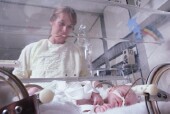
TUESDAY, April 24 (HealthDay News) — Infants with very low birth weights — less than 3.3 pounds — do better if they’re born at hospitals that have been officially recognized for nursing excellence, a new study finds.
The “RNE” designation, recognition for nursing excellence, is awarded by the American Nurses Credentialing Center when nursing care achieves exemplary practice or leadership in five areas. Only about 7 percent of U.S. hospitals receive the RNE designation.
For the new study, U.S. researchers looked at 72,000 infants with very low birth weights and found that those born at RNE hospitals had far lower rates of hospital infection (16.7 percent versus 18.3 percent), lower rates of a type of brain bleeding called severe intraventricular hemorrhage (7.2 percent versus 7.8 percent), and lower rates of death after seven days (7 percent versus 7.4 percent) compared to those born at non-RNE hospitals.
However, those born at RNE hospitals did not have a significantly lower death rate after 28 days or a lower death rate while in hospital, according to the report published in the April 25 issue of the Journal of the American Medical Association.
The better outcomes among very low birth weight infants born in RNE hospitals may be due to higher-quality neonatal intensive care unit and obstetric care, the authors pointed out in a journal news release.
“Perhaps RNE hospitals have a broad, long-standing commitment to quality care that is reflected in other aspects of care, such as excellent physician care, respiratory care or infection control, that are not directly related to RNE but that may independently contribute to better outcomes for very low birth weight infants,” Eileen Lake, of the University of Pennsylvania School of Nursing in Philadelphia, and colleagues wrote.
“Thus, RNE status may serve as a marker for an institution-wide commitment to optimizing outcomes,” they concluded.
More information
The March of Dimes has more about low birth weight babies.

